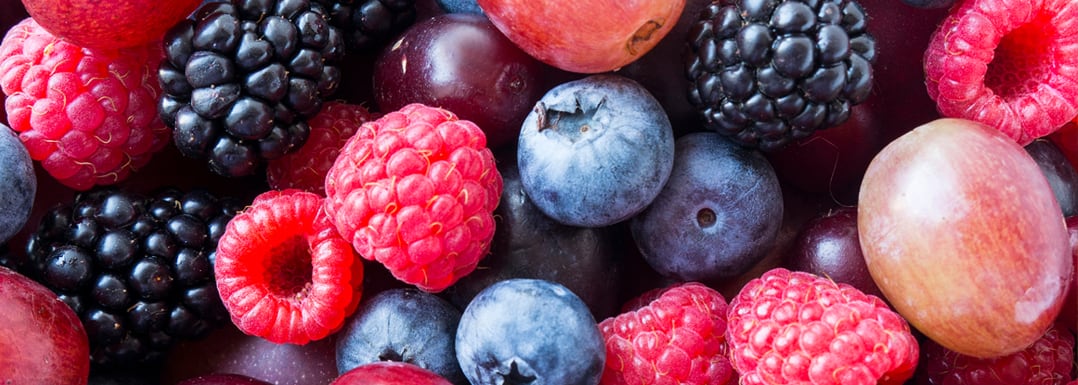Polyphenols: The colors of health
Evidence for the health benefits derived from consuming broad-spectrum polyphenols continues to build. For example, PubMed, the highly respected database for the National Institute of Health (NIH), lists published studies that validate the following benefits:
Improvement in heart health and antioxidant benefits: Experts believe that this is largely due to the antioxidant properties of polyphenols, which help reduce chronic inflammation, a risk factor for heart disease.1
Improvement in blood pressure and LDL cholesterol levels: Two recent reviews link higher polyphenol consumption to lower blood pressure and LDL (bad) cholesterol levels, as well as higher HDL (good) cholesterol.2
Digestion and probiotic benefits: Polyphenol consumption may benefit digestion by promoting the growth of beneficial gut bacteria while fending off harmful ones.3
Improved brain function: Several studies have shown improvement in brain function, particularly in adults with mild mental impairment.4,5

Polyphenol-C: Non-GMO vitamin C with berry polyphenols
In its key natural sources, vitamin C arrives packaged in fruits and berries with a range of polyphenol co-factors. However these key components generally aren’t present in most of today’s vitamin C supplements. For the many consumers who look for a more complete, premium approach to health, Polyphenol-C provides an answer by providing a wide spectrum of fruit and berry polyphenols with non-GMO vitamin C. Each gram of Polyphenol-C contains 600mg of Non-GMO vitamin C and 400mg of fruit extracts/concentrates standardized to 25% polyphenols (100mg total polyphenols).
Polyphenol-C is one result of Ethical Naturals' (ENI) decade of working on the development and analysis of the different categories of polyphenols. These include flavonoids, phenolic acids, anthocyanins, proanthocyanins, resveratrol, and others.
From this work ENI makes available a wide range of high-level polyphenol-based ingredients for use in supplements, powders and beverages. These include: VinCare patented whole grape extract; ResVinol natural resveratrol and red wine extract; Resveratrue 98% natural resveratrol; and Cranberex standardized cranberry extract supported by clinical studies at Rutgers University.
Testing and analysis of polyphenols: Though thousands of polyphenol compounds exist in nature, and are used as supplement ingredients, the analysis of potency levels is complex, and results can often be misleading. For example, many suppliers determine procyanidin (PAC) levels using the Bate-Smith assay; this is a colorimetric method that often gives very high readings, with variability up to 20%. A more reliable method, used by ENI, is the UV-Folin-Ciocalteu method that is more stable and produces more accurate (but often lower) results.
Additionally, some years ago a number of respected publications began reporting more sophisticated polyphenol adulteration in expensive products such as Bilberry extract. In these cases other cheaper sources of polyphenols were added to successfully fool the UV test results. Fortunately, more advanced and specific methods (based on HPLC) were developed that could detect this adulteration. ENI now also uses the USP-HPLC method that allows accurate identification and quantification of both the total and each individual anthocyanin and anthocyanidin compound. This assures that cheap ingredients haven’t been added to falsely increase the real polyphenol percentages.
Key ingredients of Polyphenol-C include:
- Vitamin C (non-GMO, IP Certified)
- VinCare® Whole Grape Extract (whole fruit of Vitis vinifera)
- Blueberry Extract (whole fruit of Vaccinium myrtillus)
- Cranberex® Cranberry Extract (whole fruit of Vaccinium macrocarpon)
- Blackberry Concentrate (whole fruit of Rubus laciniatus, armeniacus, ursinus, & fruticosus)
- Raspberry Concentrate (whole fruit of Rubus idaeus and/or Rubus strigosus)
- Strawberry Concentrate (whole fruit of Fragaria virginiana)
A summary of the important health benefits of Polyphenol-C that have been discussed in scientific literature and can be used in S/F claims include:
- Essential co-factor for important enzyme systems
- Essential for joints and connective tissues
- Antioxidant
- Immune support
- Supports healthy cardiovascular function
- Supports long-term cognitive and brain health
Combining vitamin C with high-grade polyphenol sources follows nature’s footsteps. Cal Bewicke, CEO of ENI states: "In the vitamin C category, Polyphenol-C is an exciting and timely development. Today and for the future, people are looking for nature based immune and health support products. With the work we’ve done on polyphenol development, this makes another step in bringing a more complete spectrum of nature’s ingredients into one supplement product."
If you are attending SupplySide West in Las Vegas, October 25-26, please visit ENI at booth #2420 to talk about Polyphenol-C®, GreenGrown® glucosamine, Cranberex® and its line of special ingredients.
References
1. Tangney CC, Rasmussen HE. Polyphenols, inflammation, and cardiovascular disease. Curr Atheroscler Rep. 2013 May;15(5):324. doi: 10.1007/s11883-013-0324-x. PMID: 23512608; PMCID: PMC3651847.
2. Cheng YC, Sheen JM, Hu WL, Hung YC. Polyphenols and Oxidative Stress in Atherosclerosis-Related Ischemic Heart Disease and Stroke. Oxid Med Cell Longev. 2017;2017:8526438. doi: 10.1155/2017/8526438. Epub 2017 Nov 26. PMID: 29317985; PMCID: PMC5727797.
3. Marín L, Miguélez EM, Villar CJ, Lombó F. Bioavailability of dietary polyphenols and gut microbiota metabolism: antimicrobial properties. Biomed Res Int. 2015;2015:905215. doi: 10.1155/2015/905215. Epub 2015 Feb 23. PMID: 25802870; PMCID: PMC4352739.
4. Krikorian R, Nash TA, Shidler MD, Shukitt-Hale B, Joseph JA. Concord grape juice supplementation improves memory function in older adults with mild cognitive impairment. Br J Nutr. 2010 Mar;103(5):730-4. doi: 10.1017/S0007114509992364. Epub 2009 Dec 23. PMID: 20028599.
5. Vauzour D. Dietary polyphenols as modulators of brain functions: biological actions and molecular mechanisms underpinning their beneficial effects. Oxid Med Cell Longev. 2012;2012:914273. doi: 10.1155/2012/914273. Epub 2012 Jun 3. PMID: 22701758; PMCID: PMC3372091.






